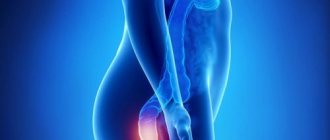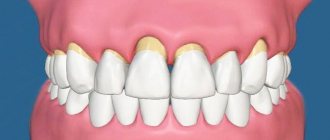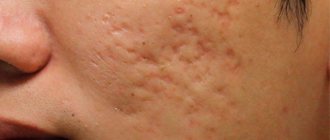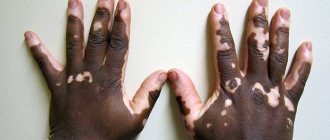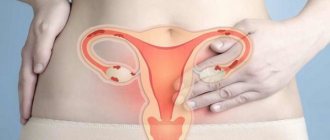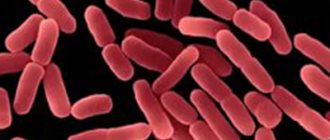Hemorrhoids in pregnant women are a very common problem for women during pregnancy. Approximately 8% of all girls who have not given birth and are not pregnant have it, more than 25% of girls are diagnosed during pregnancy, and almost 50% of new mothers suffer from this problem. Some believe that there is nothing serious or terrible about this, and do not engage in treatment. But they are making a huge mistake. After all, if hemorrhoids are not treated during pregnancy, they can cause serious complications.
What kind of disease is this
Hemorrhoids are a pathology caused by overflow of blood in the venous plexuses (the so-called cavernous bodies), which are located in the anal canal. Enlarged, altered plexuses are called hemorrhoids.
Hemorrhoids in pregnant women can be primary or secondary. Primary hemorrhoids occur due to poor nutrition, physical inactivity, heredity, including pregnancy and childbirth.
Pregnant women really often encounter this delicate, discomforting disease. This is due, first of all, to the pressure that the enlarged uterus exerts on the vessels.
The pressure organ, which serves as a “house” for the fetus for all 9 months, compresses the inferior vena cava, which changes the blood flow in the pelvic organs. Congestion occurs; they, as some proctologists say, “sponsor” hemorrhoids. Indeed, congestion in the pelvis is dangerous: blood overflow forms in the venous plexuses of the rectum. Hemorrhoids swell, change color, and become inflamed.
In the first stages of the disease, this leads to itching and discomfort in the anus, a feeling of the presence of a foreign body in the anus. And, most importantly, bleeding from the rectum is observed. It could be literally a couple of drops of blood on toilet paper or underwear. The frequency of bleeding is not so important: if you notice it several times a month, go to the doctor. If you encounter them a couple of times a year, you still need to go to a proctologist.
At the second stage of hemorrhoids, the symptoms intensify: the nodes fall out. They correct themselves, but this does not mean that the body copes well with the disease without the help of doctors. The next stage is that you will have to set the knots by hand. And if you miss that too, then without the help of doctors it will be impossible to straighten the nodes into the anus.
How does external hemorrhoids manifest in pregnant women?
Unlike the internal localization of nodes, external hemorrhoids manifest themselves with a clear clinical picture from the first days.
The very first symptom of external hemorrhoids is pain of varying intensity in the anus, which occurs during bowel movements, while sitting on a hard surface or wearing tight clothing. The pain may also increase when coughing, sneezing, or walking.
In addition to pain, women are concerned about itching and burning in the anal ring, which increases after bowel movements, and bleeding of the external nodes. Bleeding occurs mainly due to damage to the nodes by dense feces that form during constipation. Patients notice blood on the toilet, toilet paper, underwear or clothing.
In the first days, a pregnant woman may assume that she has external hemorrhoids by feeling dense, painful nodules around the anal ring with her fingers.
How can a pregnant woman understand that she has hemorrhoids?
Hemorrhoids during pregnancy can occur, as it seems to the expectant mother, spontaneously. Everything was fine and suddenly something protruded from the anal canal, some kind of rose-shaped clot. Of course, the woman guesses - it’s hemorrhoids. And, as you can understand, this is not the first stage. Probably, the first stage was either asymptomatic, or the patient ignored the signs of the disease and mistook them for the nuances of pregnancy.
How to understand that you have hemorrhoids:
- Rectal bleeding is an early stage disease that can still be easily corrected with traditional medications;
- Itching, discomfort, burning and soreness in the rectum - this does not always indicate hemorrhoids, but during pregnancy the risk that negative sensations are a marker of hemorrhoidal disease is very high;
- Difficulty during bowel movements;
- Prolapsed nodes are small knob-like formations that come out of the anal canal; these are prolapsed hemorrhoids;
- Irritation in the anal area.
The symptoms of hemorrhoids during pregnancy will be different at each stage of the disease. The first stage is bleeding (there may be no other signs at all), the second is the loss of nodes, the third is the impossibility of their self-reduction, and the fourth is the inability to even manually set the nodes into the anus. A proctologist knows how to deal with hemorrhoids during pregnancy. Remember: the gynecologist who is caring for your pregnancy should know about this pathology. But only a specialist can treat it. That is, a proctologist.
Effective folk remedies
To improve the effect of medications, doctors recommend using traditional medicine. However, the specialist will prescribe them himself.
- To treat this disease, celandine is used. A tampon is soaked in its juice, which is then placed in the rectum and kept for about an hour.
- Sea buckthorn oil is also used for these purposes. Make a compress. The product is applied to gauze and applied to the anus. You need to change it 4 times a day; it is better to change the bandage in the evening and you can leave it on until the morning. It is useful to drink the oil; for this, before eating in the morning, you need to drink a tablespoon.
Hemorrhoids in the first trimester of pregnancy
The first trimester is relatively safe in terms of the possible occurrence of hemorrhoids. If there is a disease, it rarely gives a woman anxiety. This is both good and bad at the same time. Hemorrhoids in the first trimester may occur without symptoms, but this does not mean that they will not appear further. And already in the later stages of pregnancy the disease will manifest itself with quite serious symptoms.
On the other hand, if the disease manifests itself in the first trimester, the alarmed expectant mother will begin to intensively treat it - and she will not always do this under medical supervision. He will buy suppositories or ointment at the pharmacy, the composition of which may be unacceptable in the first trimester.
Remember that it is in the first 12 weeks that the organs of the fetus are laid down and the neural tube is formed. This is the most responsible process, and any medications entering the body at this time must be prescribed by a doctor. The consequences can be dire.
If you see a doctor in the first trimester, the proctologist will explain to you that the therapy should be gentle and comprehensive. Surgical methods, if necessary, are not used in the early stages of pregnancy. The doctor chooses those conservative remedies for hemorrhoids during pregnancy that are absolutely harmless.
How to treat hemorrhoids in pregnant women in the first trimester:
- Natalsid candles. This pharmaceutical drug is safe for expectant mothers and nursing mothers, therefore it can be prescribed from the first weeks of pregnancy. Fights inflammation and bleeding well. It is prescribed for internal hemorrhoids.
- Suppositories with propolis. This medicine has a good antiseptic and wound healing effect. They are great for relieving pain.
- Candles with sea buckthorn. Sea buckthorn oil, which is the basis of these candles, is a completely natural product. It has a characteristic smell and bright orange color. This oil perfectly relieves signs of inflammation, heals small cracks and wounds, relieves burning and itching.
- Vishnevsky ointment. It can be prescribed for external hemorrhoids. Helps with pain and inflammation. But a pregnant woman may be highly sensitive to the active components of the ointment; the doctor must foresee this. Fleming's ointment. This is a medicinal herbal product based on sea buckthorn and chamomile. The ointment destroys pathogenic organisms, relieves symptoms of hemorrhoids, and helps to reduce nodes.
Candles Natalsid
Suppositories with propolis
Candles with sea buckthorn
Vishnevsky ointment
Treatment of hemorrhoids during pregnancy in the first trimester does not mean that you take this list and buy everything that is indicated in it at the pharmacy. No, most likely, you will be prescribed 1-2 drugs from the list, and will also be given valuable recommendations regarding proper nutrition. If you already had a pathology, and an exacerbation of hemorrhoids occurred during pregnancy, the treatment will be the same. If surgery is needed, you will have to wait - probably surgical procedures will only be performed after childbirth.
Causes of hemorrhoids formation
Pregnancy is a natural condition for a woman and as such is not the cause of hemorrhoids. A number of physiological changes in the body create favorable conditions for influencing the rectum.
The reasons for the formation of hemorrhoids in pregnant women are predisposing and provoking.
Predisposing reasons are:
- the presence of such a disease in close relatives;
- Women over 30 suffer from problems with the walls of the anus in half of their pregnancies.
Provoking reasons
The list of reasons that provoke inflammation of the rectal veins during pregnancy has many components. Here are the main ones:
- The rapidly growing uterus puts pressure on the veins of the small pelvis. The vessels of the rectum dilate, and stagnation occurs due to impaired blood flow. The 3rd semester is the main period of exacerbation of hemorrhoids, since the child’s growth in the uterus is activated.
- The growing uterus puts pressure on the intestines, impairing its function and causing frequent problems with bowel movements. Digested food stagnates, hardens, the rectum and blood vessels are often injured. The result of constipation is the formation of a venous node.
- In the early stages of pregnancy, provided that it proceeds normally, the woman remains active and is not yet familiar with such a delicate problem. In the middle and closer to the due date, the expectant mother rests more and often faces stagnation in the circulatory system of the legs and digestive system.
- Changing food habits during pregnancy also affects bowel function. Products with a spicy or salty taste provoke blood flow to the intestines, and their constant consumption leads to stagnation of lymph and the formation of lumps in the rectum.
Hemorrhoids in the second trimester of pregnancy
At this stage, it is easier to fight the disease. Hemorrhoids during pregnancy in the 2nd trimester allows the doctor to prescribe the expectant mother not only safe suppositories and ointments, but also add those drugs that affect the root cause of the disease. For example, doctors often prescribe Toxerutin to pregnant women: it strengthens capillary walls, reduces the risk of blood stagnation in blood vessels, and inhibits inflammatory processes. Vascular tone increases, swelling of the venous plexuses is relieved, and blood viscosity decreases. This is important from the point of view of preventing thrombosis in rectal nodes.
Escin gel is also prescribed. It relieves itching in the anal area and reduces pain. If the inflammation is acute, the doctor may prescribe calcium dobesilate to the patient. Ointments and rectal suppositories will also be prescribed: the proctologist will assess the severity of the disease, the complex of symptoms and select those local remedies that will be most effective and safe in a particular situation.
Symptoms of pregnant women with hemorrhoids
Hemorrhoids are a very delicate disease, but its symptoms cannot be confused with any other disease. In pregnant women, this problem manifests itself as follows:
- Sensations that cause discomfort in the anus - pain, burning, itching. The sensations intensify when sitting, walking or doing minor physical activity.
- The passage of hemorrhoids during defecation. Often a pregnant woman feels severe pain during this process.
- External hemorrhoids during pregnancy are accompanied by the release of blood clots during bowel movements. In severe cases, blood may flow from the anus in a thin stream.
A pregnant woman should under no circumstances ignore this disease. If any suspicion arises, you should immediately consult a doctor. Diagnosis of the disease is painless and absolutely safe for mother and baby. As a rule, an experienced proctologist will determine the degree of the disease after a visual examination and according to the patient.
At the first problematic bowel movement, a pregnant woman should go to the nearest medical facility. During the period of bearing a child, the body of the expectant mother is very vulnerable.
Hemorrhoids in the third trimester of pregnancy
The third stage of pregnancy is the ripening of the fetus and the preparation of the mother’s body for childbirth. Treatment of hemorrhoids at this time should not provoke a deterioration in the pregnant woman’s condition or premature delivery. The disease cannot be ignored, since the threat of rectal bleeding is a threat of premature pregnancy.
During this period, the doctor often prescribes systemic medications to the expectant mother that work throughout the entire body, improve blood circulation, and prevent blood clots from developing.
What medications can be prescribed in the third trimester:
- Detralex. These venotonic tablets are usually prescribed for exacerbation of chronic hemorrhoids.
- Aescusan. Drops are prohibited during pregnancy; you can only take tablets according to the regimen. The drug is sold by prescription.
- Troxerutin. Venotonics in capsules, usually taken three times a day after meals.
- Duphalac (syrup). This remedy is prescribed by the doctor if the expectant mother suffers from constipation.
Detralex
Aescusan
Troxerutin
Duphalac
Among the local drugs allowed in the third trimester: Relief Advance suppositories/ointment, rectal suppositories Alginatol and Natalsid, Ultraproct suppositories/ointment, Gepatrombin, Anuzol Neo.
Your doctor will tell you how specifically to treat hemorrhoids during pregnancy in the 3rd trimester. He will also monitor how effective the treatment is, whether it needs to be adjusted, etc.
Useful tips and tricks
- To avoid blood stagnation in the pelvis, you need to move as much as possible: walk, do simple exercises.
- Do not overeat and limit your consumption of fatty, salty and spicy foods.
- Alcohol should be prohibited for a pregnant woman anyway.
- The body must receive a sufficient amount of vitamins and fiber from the diet.
- You can't lift heavy things.
Remember!!!
Symptoms of hemorrhoids during pregnancy may not be felt for a very long time.
A woman who feels changes in her body every day may simply not pay attention to the onset of hemorrhoids. The growing uterus and the increasing size of the fetus put pressure on neighboring organs, this is especially felt from the middle of the second trimester. It is during this period that a woman who is attentive to her body can recognize the first signs of hemorrhoids.
At an appointment with a proctologist
Of course, going to a doctor who treats such intimate problems is exciting. But once you visit a good and experienced specialist, the fear of his office door will leave you for a long time.
On the eve of the appointment, you must do a microenema - the examination involves examining the cleaned anal canal. The optimal time for this procedure is 3-4 hours before coming to the doctor. Take a clean diaper and socks with you. The proctologist will examine you on a special chair, very similar to a gynecological one, or on a couch.
The examination is painless, delicate, and short. Of course, you cannot do without embarrassment, but if you find a doctor who inspires your trust, there will be no problems. Proctologists examine pregnant women with even greater caution and attentiveness - a routine examination will not cause any harm to the pregnancy.
If your gynecologist discovered a problem and advised you to go to a proctologist, do not ignore his words.
Diagnostics
If symptoms of hemorrhoids are detected, a pregnant woman should consult a surgeon. If necessary, he will refer you to a specialist - a coloproctologist. Diagnosis is made by palpation of the anus. This method allows you to identify 9 out of 10 cases of hemorrhoids.
Internal nodes located in the submucosal layer of the rectum are more difficult to diagnose than external ones, so it may be necessary to:
- sonography - ultrasound examination;
- sigmoidoscopy - examination using the introduction of a special device with an optical eyepiece.
Toilet and hygiene during pregnancy
At your appointment, the doctor will definitely tell you how important hygiene of the perineal organs is during pregnancy. Any wrong actions can lead to diseases - from hemorrhoids to vaginosis, cystitis and other ailments. To avoid such questions as “a pregnant woman has hemorrhoids – what should I do?”, you need to initially know how to go to the toilet correctly. The very posing of the question may seem funny to some, but if you are diagnosed with hemorrhoids, you are unlikely to want to laugh.
How to go to the toilet correctly:
- You need to empty your bowels in one go. A normal bowel movement takes 2-7 minutes.
- If you like to sit on the toilet for more than seven minutes (you can even “hang” in the toilet for half an hour), do not ask later why hemorrhoids have worsened or appeared in pregnant women.
- Sitting on the toilet for a long time by the expectant mother is fraught with the fact that the blood supply to the hemorrhoidal veins deteriorates, and then the manifestations of the disease intensify.
- During an exacerbation of hemorrhoids, any toilet paper is prohibited. Use the most natural and soft wet wipes. It’s better to just wash yourself with cool water after each bowel movement. Mechanical friction caused by paper increases swelling and inflammation in the anal area.
If there is a need to do an enema, then your actions should be extremely careful. Pregnant women do not do enemas unless necessary. In this case, try to use special microenemas that are sold in pharmacies.
Don’t forget these simple hygiene rules: you should wash yourself after each bowel movement.
When applying ointment to the affected area or inserting a suppository, hands should be washed thoroughly. Also keep the caps and applicators clean if you use the same ointments and suppositories.
Signs of the disease
At an early stage, a pregnant woman usually does not attach importance to the first symptoms of hemorrhoids. Minor discomfort appears after “going to the toilet” and quickly passes. The skin around the anus constantly breaks out. Humidity increases in this area. As the uterus grows, the nodes begin to fall out of the anus. The woman feels small bumps in the form of balls, which begin to grow over time. After defecation, there is a feeling of incomplete bowel movement. Hemorrhoids in pregnant women are often discovered by a gynecologist during a routine examination. The severity of the symptoms depends on the stage of development of the pathology.
First degree
A woman experiences discomfort in the anus. After bowel movements, burning and itching occurs. Defecation is painful: when the nodes are injured by hard feces, a small amount of blood is sometimes released. Unpleasant sensations, burning and heaviness can bother a pregnant woman without connection with bowel movements. Enlarged nodes in the first stage of external hemorrhoids fall out of the anus only during periods of strong straining during bowel movements. After bowel movements, they refuel themselves, without the help of hands.
During an examination by a surgeon (proctologist), the disease is immediately detected. The mucous membrane of the rectum is red, which indicates an inflammatory process. Small vessels are dilated due to blood stagnation.
Second degree
Symptoms expand as the disease progresses. At the second stage, the manifestations of hemorrhoids are more pronounced: itching and mucous discharge are added. Added to the discomfort is nagging pain in the rectal area, radiating to the lower back and sacrum. In the later stages, such symptoms of hemorrhoids greatly disturb the woman, since the uterus is constantly growing and the pressure on the vena cava increases. Typically, deterioration is observed at 38-40 weeks of pregnancy. It is during this period that the fetus drops lower, which leads to pinching of the colon.
At the second stage of external hemorrhoids, nodes can fall out not only after defecation, but also with weak tension of the anal sphincter. However, they cannot be adjusted without the help of hands. Damaged veins are large. The increase occurs due to severe inflammation accompanied by swelling. Hyperemia may spread to the area around the anus.
A hemorrhoid looks like a red bump. Palpation causes acute pain. Nodules fall out even with slight stress: coughing, sneezing, bending over. Acute pain is felt when walking or sitting. Because the sphincters reflexively tighten, it is difficult to empty the bowels. During and after defecation, the woman experiences very severe pain. When the nodes are injured, moderate bleeding from the rectum is observed.
When entering the chronic stage, swelling and redness subside. The nodes are getting smaller. Their color changes from red to pink.
Third degree
If left untreated, the disease enters an advanced stage. Swelling and redness cover the entire area between the buttocks. Large blue and purple bumps protrude from the anus. Reflexive contraction of the anus can cause difficulty urinating. Isolated thrombosis of external nodes without treatment leads to death (necrosis) of the veins. Some areas of the affected vessels turn black. Thrombosis can be complicated by extensive tissue inflammation. With a strong spasm, the hemorrhoidal node is pinched.
Therapeutic nutrition: hemorrhoids during pregnancy
When you visit a proctologist, you will receive a medication treatment regimen, as well as certain recommendations regarding nutrition. Don't discount them: proper nutrition can protect you from many problems during pregnancy. And from exacerbation of hemorrhoidal disease too.
The basis of the expectant mother’s diet is balanced, fortified food, rich in coarse fiber.
You should eat in such a way as to avoid constipation. For this purpose, the entire daily menu should be divided into 5-6 meals. This will be the correct fractional nutrition. Eat small portions: overeating is dangerous. Avoid foods that thicken stool.
But not only constipation, but also diarrhea is dangerous as a provocateur of hemorrhoids. Excessively softened feces will not only cause a lot of unpleasant sensations (stomach twists, cramps occur), but will also force a woman to spend a lot of time on the toilet. And this, as already mentioned, also leads to hemorrhoidal exacerbations. Finally, diarrhea leads to inflammation in the rectum, which also provokes hemorrhoids.
If inflammation occurs, you need to:
- Completely avoid fried foods, smoked foods, pickles and pickled, spicy foods;
- Limit sweets too - you can eat a couple of marmalade slices, marshmallows or marshmallows, a little oatmeal cookies in the first half of the day, but no more;
- Limit food of animal origin - cottage cheese, sour cream, butter;
- You can eat meat and fish, but in moderation, and preferably low-fat varieties;
- Chocolate, grapes, legumes are on the list of taboo foods for the expectant mother; they cause the formation of intestinal gases (just like carbonated drinks and baked goods).
What then is there? Vegetables and fruits are what will improve your digestion. The fiber present in these products improves intestinal motility and promotes easy passage of feces through the intestines. The so-called spreadable porridges (with the exception of semolina and rice porridge) will also be useful. Also include beetroot dishes in your weekly menu; salads with prunes are also healthy.
Treatment
The doctor selects treatment tactics depending on the degree and symptoms of hemorrhoids.
Treatment of the disease during pregnancy includes several stages:
- menu revision;
- gymnastics;
- adjustment of regime and hygiene procedures;
- drug therapy;
- prevention of exacerbations;
- excision of nodes (with frequent exacerbations accompanied by pain and bleeding).
If hemorrhoids have just begun to develop and do not cause a woman much discomfort, they can be eliminated through diet, exercise, and intensive hygiene. During exacerbation of the disease, these methods are also used, but they are ineffective without the use of special drugs.
Diet features
Constipation is the main factor causing the development of hemorrhoids. To improve intestinal function and soften stool, you need to include the following foods in your diet:
- broccoli;
- cauliflower;
- carrot;
- zucchini;
- beets;
- dried fruits;
- kiwi;
- apples;
- buckwheat;
- pearl barley;
- Hercules.
Fatty meats, lard, baked goods, and cream are excluded from the menu. Such dishes slow down digestion. Intestinal motility is impaired. This leads to hardening of stool and constipation. If a pregnant woman has hemorrhoids, hot, spicy, pickled, and smoked dishes are removed from the menu. Such food increases blood flow to the vena cava. In addition, these dishes irritate the intestines and inflamed nodes.
Particular attention is paid to the drinking regime. Lack of fluid slows down metabolism, leading to chronic constipation.
Drug therapy
The choice of treatment regimen depends on the duration of pregnancy, the type of hemorrhoids (external or internal), and the degree of damage to the nodes. Women are usually prescribed external medications: ointments, creams. Chronic hemorrhoids without pronounced symptoms during pregnancy are treated with drugs that increase the tone of the walls of blood vessels.
Permitted drugs:
- Troxerutin in the form of gel and capsules. The product has anti-inflammatory and antispasmodic effects. Tablets in capsule form are taken once a day to prevent exacerbations. The gel is applied to the bump in the morning and evening.
- Ginkor forte to normalize venous blood flow. Active ingredients: troxerutin and plant components. The drug cannot be used for hyperthyroidism (pathology of the thyroid gland).
Most drugs for the treatment of external nodes are prohibited in the early stages, but can be used in the 2nd and 3rd trimester of pregnancy after consultation with a doctor.
Medicines that can be prescribed for exacerbation of hemorrhoids:
- Heparin ointment. The active substance stimulates the resorption of existing clots inside the vein. Heparin ointment also prevents the dilation of nearby blood vessels.
- Vishnevsky ointment. The product is applied to gauze folded in several layers and fixed between the buttocks. The product helps relieve inflammation and has bactericidal properties.
- Doxium to relieve swelling and reduce blood viscosity. The drug reduces the permeability of vascular walls and slows down the formation of blood clots.
- Gepatrombin G suppositories to prevent blood clotting in the hemorrhoidal node. The drug eliminates itching and relieves acute pain. The size of the cone decreases because swelling is eliminated.
- Relief Advance. The product is produced in the form of ointments and suppositories. Relief Advance helps get rid of hemorrhoids, because... have anti-inflammatory, healing effects. The main active ingredient is shark liver oil. This drug can be used to treat hemorrhoids in combination with anal fissures. Relief Advance cream is used as a local anesthetic after surgery.
- Troxevasin. The ointment reduces the fragility of blood vessels, relieves inflammation, and prevents thrombosis. The medicine helps with acute pain, reduces burning and itching.
External products (ointments, creams, gels) are applied to a cotton pad and pressed between the buttocks. The doctor prescribes the dosage and duration of compresses individually. In advanced cases, external remedies during pregnancy are taken in combination with tablets and capsules. This combination provides a more sustainable effect in the treatment of hemorrhoids.
Surgery
Excision of the affected nodes is carried out with frequent exacerbations, strangulation and necrosis of prolapsed veins. Heavy bleeding is also a reason for surgery.
Bloodless methods of surgical treatment are mainly used:
- Pinched by latex ring. The node dies off 7-10 days after the procedure.
- Laser coagulation. The node dies when exposed to the beam.
If the condition of a pregnant woman can be improved with the help of drug therapy, the operation is postponed until the postpartum period.
What are the dangers of hemorrhoids during pregnancy?
The main danger of inflammation of the hemorrhoids for the expectant mother is the complicated period of the last weeks of gestation, as well as difficulties during childbirth.
If childbirth takes place naturally, the baby moves through the birth canal into the mother's vagina. The pressure in the pelvic area increases significantly at this time, and the pressure in the abdominal cavity also increases. The natural force of pushing contributes to this. Not all women push correctly and effectively; many women in labor do it with great effort, but not quite technically. As a result, the pressure in the pelvic area increases even more, and this becomes dangerous.
In addition, the position of the fetus in the birth canal can also contribute to compression of the inferior vena cava, which leads to poor circulation. All together contributes to compression of the veins of the rectum and stagnation of blood in them. Hemorrhoids swell, the affected area swells, turns red or blue.
It is also not uncommon when a complicated period of pushing leads to tearing of the skin and mucous membrane of the perineum with the appearance of cracks, and this tear extends to the anal area. Strong pushing and movement of the child along the birth canal aggravate existing hemorrhoids, which is why postpartum hemorrhoids are so common in young mothers. The disease can move from the first stage to the second, from the second to the third.
What are hemorrhoids and why do they appear in pregnant women?
Hemorrhoids are a fairly common pathology of the rectum. It appears due to the overflow of the blood vessels of the intestine with blood, which leads to dilation of the vein. This is how hemorrhoids are formed.
A passive lifestyle affects blood circulation, this is the main reason for stagnation of blood in the veins. When a person sits in one place for a long time, he warms both the chair and his body, and this creates the effect of a heating pad. Such conditions are favorable for the accelerated growth of hemorrhoidal cones.
An unhealthy, irrational diet has an additional effect, especially if a woman is used to eating fast food. This affects the functioning of the pancreas and thyroid gland.
Excess weight only aggravates the situation; if a person moves little, she suffers from constipation. The hereditary factor plays a significant role if relatives have dilation of these veins.
The development of the disease is influenced by the use of certain medications, such as oral contraceptives or laxatives, if a woman abuses them. Unhealthy lifestyle, frequent consumption of alcoholic beverages.
Some sports also influence the development of the disease. For example, cycling or horseback riding, lifting significant weights. The latter, of course, is more common in everyday life, when a girl constantly carries heavy bags.
Can hemorrhoids during pregnancy cause a caesarean section?
And this question is also asked by every pregnant woman who has hemorrhoids. The disease itself is not a contraindication for physiological childbirth. But in some cases, with complicated hemorrhoids, the doctor may prescribe a planned cesarean section. This will avoid serious consequences that may occur during the pushing period - for example, severe rectal bleeding.
Caesarean section for hemorrhoids is prescribed:
- At the last stage (fourth) of hemorrhoidal disease;
- With diagnosed thrombosis of hemorrhoids;
- If a bacterial infection is detected;
- For prolonged hemorrhoidal bleeding.
During natural childbirth, the load on hemorrhoids undoubtedly increases. And this is fraught not only with their falling out of the anal canal, but also with pinching of the nodes. The cause of pinching may be the sphincter closing too quickly after pushing the child. In this situation, the fallen nodes cannot return to their place on their own, and if the obstetricians do not have time to set them, pinching occurs. But still, such cases are rare, doctors manage to foresee them.
How to prevent hemorrhoids during childbirth?
Primary hemorrhoids can appear during labor in women who have not previously been bothered by them. To avoid damage to the nodes, you must listen to the midwife and follow her commands. Tips help you concentrate on tensing only the necessary muscles, avoiding ruptures and bleeding.
If a woman is not prepared for childbirth with preventive treatment, then pinching of prolapsed nodes, acute thrombosis, and bleeding are possible. With internal hemorrhoids of stage III-IV, swelling of the genital organs occurs, inflammation spreads to adjacent tissues (paraproctitis), and the formation of fistula tracts. Weakened patients are at risk of sepsis. The condition is dangerous for the fetus.
The risk of complications increases:
- if the child weighs 4 kg or more;
- in case of weak uterine contractions;
- when the woman in labor is over 40 years old.
Many perinatal centers practice vertical birth. They are considered less traumatic and shorten the period of contractions by 2-3 hours. According to obstetricians, if during a horizontal birth every fourth woman has to cut the perineum to facilitate the passage of the fetal head, then the vertical version requires this intervention only in 5% of cases.
Prevention of hemorrhoids after childbirth involves raising the foot end of the bed to facilitate blood flow. Worsening of the condition is observed even with caesarean section. This is due to forced bed rest and limited mobility.
The perineum is treated by washing with antiseptics.
After being discharged home, the woman must follow a diet and gradually engage in physical exercise to restore the muscular frame of the pelvic floor.
Depending on the consultation with the proctologist, the question of the advisability of surgical treatment is decided or conservative measures are prescribed.
Prevention of hemorrhoids: advice for pregnant women
You already know the dangers of hemorrhoids during pregnancy, so arming yourself with preventive advice will not be superfluous.
How to protect yourself from hemorrhoids:
- Normalize your diet. Remove anything that causes constipation. Eat often and in small portions, breakfast should be rich and nutritious, and dinner should be light. Drink a lot, but no more than what is comfortable for you during pregnancy. In the last months of pregnancy, it seems that any extra sip of water leads to an immediate urge to go to the toilet, so do not torture yourself by fulfilling the norm of “2 liters of clean water a day at any cost.”
- Do not sit on the toilet for more than 5-7 minutes. The more you sit, the worse blood circulation in the pelvic organs becomes. In addition, this quickly turns into a bad habit, which threatens hemorrhoids.
- Try to lead an active lifestyle. The more time you spend on the couch and in front of the monitor, the more extra pounds you will earn. This is harmful to the heart and blood vessels, lungs and muscles, and your psychological state.
- Follow the rules of personal hygiene. Do not use toilet paper - only wet wipes with a natural composition. After each bowel movement, wash your anus with cool running water.
- If eating doesn't help your constipation, ask your doctor if you can use microenemas.
- Do not use any medicine (including herbal formulations) without your doctor's permission. Any tablet, suppository or ointment is used as prescribed by the doctor. If it is not possible to see a proctologist, consult your gynecologist.
- Prevention of hemorrhoids in pregnant women is actions that are performed even before the child is conceived. If you realize it already at the end of the third trimester, it will be very difficult to avoid complications during and after childbirth.
If someone advises you not to go to the doctor again, but to resort to alternative medicine, be skeptical about such advice. Not all herbs are safe for the expectant mother. Unknowingly, you can harm yourself with such herbal medicine: miscarriages, premature births, and poisoning occur.
Prevention of disease during pregnancy
In order to prevent hemorrhoids before childbirth, obstetricians-gynecologists recommend:
- do not avoid examinations and do not hide the appearance of new signs from the doctor;
- take measures to have regular bowel movements;
- monitor the completeness of the diet;
- ensure the implementation of hygienic procedures (washing in the morning and evening, after defecation);
- maintain motor mode, perform special exercises.
To prevent exacerbation of chronic hemorrhoids during pregnancy, obstetricians distinguish 3 groups of women according to different observation tactics and the need for preventive medications:
- I - there are no manifestations, treatment is not required, the signs can be eliminated by the correct regimen, walks, diets, physical therapy;
- II - in women, enlarged nodes are observed, hemorrhoids are assessed as stage II-III, the symptoms are quite pronounced. Necessary prevention consists of preventing complications, treating with available conservative methods (ointments, rectal suppositories, washing and baths with anti-inflammatory herbal decoctions, taking drugs that are safe for the fetus orally). Diet and regimen complement the treatment complex;
- III - includes women with repeated births, frequent recurrences of hemorrhoids, and non-reducible nodes. Monitoring and treatment are required constantly, and hospitalization is often necessary (especially due to bleeding and strangulated nodes). Proctologists, together with gynecologists, decide on the type of delivery, the possibility of a cesarean section, and the timing of surgery.
Minimally invasive methods (sclerotherapy, laser coagulation, cryodestruction, ligation) are used as a temporary measure. They are contraindicated for rectal fissures, thrombosis, paraproctitis. There is no guarantee that when labor contractions begin, a new exacerbation will not occur. Therefore, this group is the most dangerous in terms of the risk of complications.
Alternative medicine: should pregnant women treat hemorrhoids with folk remedies?
Most of the folk recipes for hemorrhoids work with little effectiveness. Sitz baths using mixtures of medicinal herbs can relieve mild irritation in the anal area and soothe the skin, but nothing more. Even at the first stage of the disease, they do not give the same effect as the course use of sea buckthorn suppositories, for example.
Steam baths are a separate story. This is a painful topic for many proctologists who are forced to deal with the consequences of such “natural” treatment. To understand the essence of the process: a mixture of medicinal herbs is added to boiled water in a container. The vapors of this composition should have a positive effect on the condition of the veins in the anal canal. A wooden lid with holes is placed on top of the bucket or basin. You need to sit on this lid with your buttocks, and even so that one of the holes coincides in direction with the anal canal.
In practice, instead of the beneficial effects of healing steam, burns of the skin and mucous membranes are increasingly occurring. Naturally, this has nothing to do with recovery. First, doctors have to treat burns, and then they take on hemorrhoids, which can worsen even more. Such experiments are dangerous for any person, and even more dangerous for a woman carrying a child.
Hemorrhoids in pregnant women are a common occurrence, and they require a medical response.
Hemorrhoidal disease must be treated whenever it appears. Do not be afraid of the negative effects of drugs: a proctologist has enough effective and safe prescriptions for expectant mothers in his arsenal. Untreated hemorrhoids can lead to serious complications during childbirth and a problematic postpartum period.
Prevention
Prevention of hemorrhoids at any stage of pregnancy includes certain restrictions and changes in some habits:
- Taking a shower after defecation. It is better to wash the anus with cool water. This measure will help avoid varicose veins. For chronic hemorrhoids, it is recommended to rinse the anus with chamomile decoction.
- Exclusion from the menu of foods that provoke the development of the disease. This category includes marinades, pickles, smoked meats, and spices. To prevent constipation, your diet should include enough fruits, vegetables and cereals.
- For persistent constipation that cannot be treated with diet, it is advisable to use laxatives approved during pregnancy. Most often, drugs with a mild effect based on lactulose are used for prevention - Duphalac, Lactuvit. To soften stool, use Transipeg and mineral oils.
- Rest should be alternated with feasible physical activity to prevent stagnation in the pelvic area.
Physical activity
A sedentary lifestyle is one of the factors that provokes the occurrence of hemorrhoids. Physical activity contributes to the health of the pelvic floor muscles, so do not neglect daily exercises. When working sedentarily, it is recommended to stand up for at least 5 minutes every hour and move actively - walk around, do several squats and swing your legs in different directions.
To strengthen your pelvic floor muscles, it is recommended to practice Kegel exercises daily, which are suitable for both men and women.
Squeeze your pelvic muscles as if trying to stop urination. Hold for 3-5 seconds and relax. Repeat 10-15 times. Over the course of 2 weeks, you need to gradually increase the delay period to 7 seconds. They need to be performed in a supine position, legs bent at the knees, feet on the floor. The following movements are used:
- Smoothly contract the pelvic muscles from the weakest tension to the strongest and also gradually release them until completely relaxed. Repeat 3-5 times.
- Squeeze your pelvic muscles and relax them as quickly as possible (about 1 time per 1 second). Repeat up to 20 times in 1 approach. You can do 1 more approach after another exercise (for example, after No. 4).
- Slowly contract the pelvic muscles to full tension and also, slowly, release for 10 seconds. Repeat 5 times.
These exercises should not be painful or cause discomfort. After 2 weeks of daily exercise, the functionality of the pelvic floor muscles will improve. Normal stool will be restored and constipation will go away.
However, certain types of physical activity can trigger the development of hemorrhoids. These are weight lifting, cycling, horse riding, weightlifting. It is better to exclude these sports or limit them to a minimum.
To strengthen your pelvic floor muscles, it is recommended to practice Kegel exercises daily.
What are hemorrhoids, types and stages
When mentioning diseases of the rectum, doctors simply cannot ignore hemorrhoids. Why? Because he occupies a leading position among them. Most often, it becomes chronic, that is, once it appears, it constantly worsens, and greatly affects the quality of life of a woman.
Firstly, inflammation in the affected area is very painful, and secondly, it entails psychological discomfort. It may be painful for a woman to sit, even though the circumstances require it. The situation is aggravated by spotting when the nodules begin to bleed.
The disease was studied in ancient Greece. Until now, different specialists have different opinions regarding how to treat hemorrhoids, but they all agree on one thing: it is necessary to alleviate the condition of patients as much as possible.
There are also a lot of causes of the disease:
- genetic predisposition – when there is dysfunction of the rectal vessels;
- constipation - when large amounts of feces put pressure on the walls of the intestine, blocking the veins, and at the moment of emptying make the woman tense;
- sedentary work or enormous physical activity involving heavy lifting;
- some diseases - uterine fibroids, intestinal cancer, fistulas;
- bad habits - alcohol, which dilates blood vessels, or smoking;
- injury and inflammation of the anus due to anal sex;
- pregnancy.
Depending on the location, mechanism of development or course of the disease, the following types of hemorrhoids can be distinguished:
- Congenital - occurs due to weak vein walls and stagnation of venous blood, as a result of which the intestinal walls are deformed, stretched, turning into painful nodules.
- Acquired is the case when hemorrhoids are the result of some disease or some condition, for example, pregnancy. It is provoked by impaired blood flow in the pelvic area or blood stagnation.
Subcutaneous or external hemorrhoids are diagnosed during a routine examination. It consists of nodules that form from the inferior venous plexus under the skin of the anus. External hemorrhoids, as they are also called, are characterized by severe pain due to the sensory nerves that penetrate the anal canal. In a calm state, the nodules cause virtually no discomfort, however, in advanced cases, women develop bumps of different sizes, itching, and bleeding anal fissures.
Internal or submucosal hemorrhoids can only be seen during endoscopic examination due to the fact that the nodules are concentrated under the mucous membrane. The presence of vegetative fibers in this area makes them practically painless. The only thing a woman can feel is partial bowel movement. Sometimes she notices mucus and pus on her underwear.
Such hemorrhoids need to be treated, even if they have not come out, because their consequences boil down to fecal incontinence.
There are 2 forms of hemorrhoids:
- acute – characterized by pain, sensation of a foreign body in the anus, burning, itching during defecation;
- chronic - a recurrent process, which, due to a long course (from several months to several years), does not cause significant pain, but bleeds from time to time.
There are 4 stages of the disease:
- with the first, nodules are formed that periodically bleed;
- with the second, they increase in size, sometimes fall out, but at the same time they reset on their own;
- with the third, it is no longer possible to straighten them;
- with the fourth, constant loss of nodes occurs, which worsens the woman’s quality of life.
Drug treatment
Treatment of hemorrhoids in pregnant women with the help of medications must be carried out under the supervision of an obstetrician-gynecologist. In serious cases, therapy is prescribed by a gynecologist and a proctologist at the same time to eliminate a negative risk to the fetus. In the later stages of the pathology, systemic drugs may be prescribed. The doctor will recommend herbal venotonics or anticoagulants. You cannot take such medications on your own.
Preference in the treatment of hemorrhoids in pregnant women is given to rectal suppositories and ointments. Such drugs in most cases have only a local effect, are not absorbed into the systemic circulation and cannot have a negative effect on the fetus. However, not all suppositories are suitable - drugs with hormones, analgesic components, and other chemicals are prohibited during gestation or are prescribed at the discretion of the doctor. The main drugs prescribed to pregnant women:
- Relief. Suppositories based on phenylephrine and shark liver oil. They have anti-edematous, anti-inflammatory and healing effects.
- Natalsid. A natural drug officially approved for the treatment of hemorrhoids in pregnant women. Consists of sodium alginate - an extract from brown algae. It has an enveloping, anti-inflammatory, hemostatic effect, accelerates the healing of hemorrhoidal fissures.
- Sea buckthorn candles. The drug is absolutely safe for pregnant women and does not provoke allergic reactions. It has healing and anti-inflammatory properties, increases local immunity. It stops hemorrhoidal bleeding well.
- Ichthyol suppositories or ointment. A drug with antibacterial, astringent and anti-inflammatory effects, increases vascular tone.
- Posterized. Homeopathic medicine based on bacterial antigens. Relieves the symptoms of hemorrhoids by stimulating local immunity, stimulates healing, and eliminates inflammation. There are no contraindications for use during pregnancy.
Rectal suppositories with a combined composition quickly relieve the inflammatory process, but are not always safe for the fetus. Proctoglivenol, Proctosan, Gepatrombin are used exclusively on the recommendation of a doctor if the benefit to the mother outweighs the risk to the child.
Most rectal suppositories are used twice a day, after natural bowel movement and hygiene of the anal area. Pregnant women should not use enemas before inserting suppositories, as this may stimulate the tone of the uterus.
Diagnosis of hemorrhoids
It is usually not difficult for a doctor to identify hemorrhoids. Specific complaints allow a quick diagnosis. A digital examination is mandatory. Sometimes, to clarify the diagnosis, it is possible to perform sigmoidoscopy - a study in which a special optical device is inserted into the rectum. It allows you to see what is happening in the rectum.
Timely identification of pregnant women suffering from hemorrhoids and timely treatment prescribed to them makes it possible in many cases to prevent the further development of this disease, complications during childbirth and the postpartum period.
Back to contents
Use of medications for prevention
To prevent the risk of hemorrhoids, medicine uses phlebotonic drugs that can increase the tone of the vein walls. They are produced in the form of ointments and tablets. This group includes drugs such as Troxevasin, Detralex, Phlebodia. For preventive purposes, they are taken for a long time - up to 6 months.
For prevention, therapeutic suppositories can also be used, but only in cases where complex treatment of already diagnosed hemorrhoids is carried out and the goal is to reduce the number of exacerbations.
Prevention and treatment of hemorrhoids
First of all, the patient needs to get rid of constipation and improve bowel function without prolonged straining. A diet rich in fruits and vegetables can help with this. For hemorrhoids, any alcoholic drinks, salty, hot, spicy, pickled, peppered foods are strictly prohibited - these products increase blood flow to the veins of the pelvic floor and primarily to the hemorrhoidal venous plexuses. You should not eat fatty foods: it slows down the passage of food through the intestines, thereby creating the preconditions for the development of constipation. Try to exclude fatty meats, high-calorie dairy products and buns from your diet. It is better to limit the consumption of onions, mustard, black bread, legumes, unripe fruits and berries. Broccoli, corn, carrots, ripe apples, beets, cauliflower, potatoes, raisins, prunes, dried apricots and honey are recommended. Porridge, especially pearl barley or oatmeal, also prevents the development of constipation.
Physical therapy and morning hygienic gymnastics, familiar to us from childhood, help improve the function of the large intestine, increase the tone of the muscles of the anal area and abdominal wall, and reduce congestion in the veins of the small pelvis. It is also recommended to lie on your back with your pelvis elevated, for example, on a small pillow, 2-3 times a day for 15 minutes.
It is very important to avoid hypothermia (especially the lower part of the body), do not sit on a cold surface, avoid long (more than an hour) walking and prolonged work in a standing or sitting position.
Mandatory hygiene procedures after each bowel movement have a good preventive effect. You need to wash yourself with cool, even cold water; you can give yourself short (15-30 - 60 seconds) ascending cold irrigation of the anal area (just turn the shower over and direct its jets upward, like a fountain).
Symptoms
Sometimes a woman has the initial stage of hemorrhoids even before pregnancy or is a consequence of a previous pregnancy. During a new pregnancy, an exacerbation of the existing disease may occur.
With hemorrhoids, the skin around the anus often appears irritated due to mucus secretion. Clinical picture of node strangulation: blue-purple bumps protruding from the anus. The pain intensifies sharply, the following symptoms are observed:
- temperature increase;
- loss of appetite;
- skin itching;
- headache;
- belching (as a sign of intoxication).
This condition is dangerous due to the development of thrombophlebitis of the veins of the rectal plexus.
What is observed during childbirth
During childbirth, hemorrhoids are especially visible. The fetal head compresses the vessels as it descends into the pelvis. The outflow of blood slows down. The nodes tighten and become denser. When a woman begins to push, the anus opens slightly and the rectal mucosa becomes visible. The doctor may notice internal and external nodes. During the fight they increase significantly, and during the break they may subside somewhat. When the head erupts, the nodes can follow it outward. Sometimes bleeding occurs from them. But in most cases, the anal sphincter closes after childbirth.
When is surgery needed?
It is better to do the operation before pregnancy or after childbirth.
Hemorrhoidal cones during pregnancy are not a reason for their urgent elimination.
But if conservative therapy does not produce any results, then the proctologist may prescribe surgery for the patient. You shouldn't be afraid of this. The intervention is carried out under local anesthesia, which does not harm the baby. In most cases, operations are performed after childbirth.
Modern methods are also used to treat hemorrhoids in pregnant women. Cryodestruction, photocoagulation, ligation with latex rings are performed on an outpatient basis. Any of these procedures lasts no more than 20 minutes, and the patient can immediately go home.
Treatment of the fourth stage of pathology consists of removing hemorrhoidal cones through surgery. The procedure is painful. The recovery period lasts quite a long time. But the result is worth it, as it eliminates the problem forever.
How can I help you
Treatment of hemorrhoids in pregnant women has its own particularities - it should help quickly, be effective and safe. Typically, conservative methods are used in combination with proper nutrition and changes in daily lifestyle. Surgical treatment is an extreme and necessary measure in exceptional cases.
The main principles of therapy are:
- diet – eat more vegetables, fruits, grains, dairy products;
- accustom the intestines to daily bowel movements with the help of proper nutrition or laxatives (mucofalk, duphalac);
- move more - attend classes at a antenatal clinic or do simple exercises at home (there are many photos of different physical therapy complexes on the Internet);
- daily hygiene procedures - do without toilet paper using cool washes or wet wipes;
- treatment using folk recipes (if hemorrhoids are in the initial stage) - sitz baths or lotions with decoctions of anti-inflammatory plants (chamomile, sage), homemade candles from raw potatoes, tampons and microenemas with sea buckthorn oil;
- drug treatment using pharmaceutical drugs agreed with the attending physician.
Doctors approve treatment with the following hemorrhoid medications for pregnant women:
- ointments - Heparin, Fleming, Vishnevsky, Troxevasin;
- candles – Natalsid, Posterizan, Sea Buckthorn, Gepatrombin G.
The effectiveness of conservative therapy is confirmed in the photo - the disappearance of nodes, reduction of edema and hyperemia in the expectant mother before and after treatment.
Hemorrhoids in pregnant women can be dealt with and it is advisable to do this before the birth of the child, so as not to delay or complicate the already difficult period of labor.
The doctor’s task is to help the expectant mother meet the arrival of her baby without additional suffering.
Hemorrhoids are considered a punishment for people who lead a sedentary lifestyle. The disease affects 10–15% of adult men and women (every second person over the age of 50). It is most common among professional groups associated with long-term sedentary work conditions (office workers, drivers, programmers, accountants). What hemorrhoids are and exactly what they look like is well known to proctologist surgeons. When examining a patient, they examine the anus and determine the stage of the disease based on signs.
Hemorrhoids are cavities (corpus cavernosa) located at the end of the rectum. In a healthy person, they help retain the contents, acting as a hermetic seal for the muscle sphincters. Blood supply is regulated by the tone of blood vessels and muscles. Depending on the location, internal formations are distinguished (above the dentate line) and external (subcutaneous).
How to treat hemorrhoids
Treatment of hemorrhoids in pregnant women takes a comprehensive approach, and all drugs must be as safe as possible for the fetus.
Candles
The following types of suppositories are prescribed for the treatment of hemorrhoids:
- Sea buckthorn. The active component is sea buckthorn oil. Suppositories stimulate the recovery processes of the affected areas of the rectum. When treating hemorrhoids, insert suppositories into the anus every morning and evening for 2 weeks.
- Natalsid. The active ingredient is sodium alginate from brown algae extract. Suppositories for hemorrhoids can be used at any stage of pregnancy. Insert suppositories into the anus 2 times a day. Treatment lasts 7-14 days.
- Papaverine. Contains papaverine hydrochloride. Relieves pain, reduces swelling of affected tissues near the anus, improves blood flow in the pelvis. Apply rectally twice a day for 14 days.
- Relief. The drug is based on components such as phenylephrine hydrochloride and shark liver oil. Relief is a symptomatic drug that eliminates pain, burning, and itching. The drug is effective for hemorrhoids of any stage and various pathologies of the area near the anus (fissures, proctitis). A lasting therapeutic effect is noticeable during the course - 2-3 weeks. You need to insert candles 4 times a day.
Ointment
For the treatment of hemorrhoids during pregnancy, the following ointments are prescribed:
- Vishnevsky ointment. The drug contains 4 elements: birch tar, fish oil, xeform, castor oil. The ointment has an irritating effect on hemorrhoids, normalizes blood circulation and accelerates recovery processes. Vishnevsky ointment does not treat hemorrhoids, but eliminates the consequences, so it is used in complex therapy. Apply the product externally twice a day.
- Ichthyol ointment. Ichthyol is a natural component containing sulfur in high concentrations. The ointment has an antiseptic and pronounced analgesic effect. The drug is indicated for complicated hemorrhoids with blood loss and inflammation of the intestine. The ointment is applied to a bandage, which must be applied to the affected area. Use the drug 2 times a day for 2 weeks.
- Heparin ointment. An anti-varicose drug containing heparin, which prevents the formation of blood clots, resolves already formed blood clots. The second component is anesthesin, which relieves pain during bowel movements or while walking. Apply the product externally twice a day.
Suppositories and ointments for hemorrhoids are used by pregnant women only as prescribed by a doctor!
Surgery
Removal of hemorrhoids is an effective method of treating stage 2 or 3 of the disease when carrying a child. In this case, their size does not allow conservative therapy.
The following types of surgical intervention exist:
- Sclerotherapy is the most effective method that can be used in the treatment of hemorrhoids of any stage except stage 4. During the operation, a specialist applies a sclerosing drug to the problem area. Under its influence, the vessels grow together, and the node dies after 1-1.5 weeks. After the operation, within 1 hour the woman can return to her normal lifestyle.
- Alloying with latex rings. This method is effective in treating internal hemorrhoids. During the operation, the node is clamped with a special ring, which blocks the access of blood. This is a minimally invasive procedure that is not dangerous for pregnant women.
- Coagulation with a laser or infrared device. This method is effective in the treatment of stage 2 or 3 hemorrhoids.
Surgery is performed only in extreme cases in acute forms of pathology. In other cases, doctors use conservative methods of therapy, avoiding surgery that is risky for a pregnant woman.
Treatment with folk remedies
Non-traditional methods of treating hemorrhoids during pregnancy can only be used in combination with other methods to relieve symptoms. The following recipes are effective:
- Potato. An effective and harmless method of treating the disease at the initial stage of development. Make candles from the root vegetable that will have the size and shape of traditional ones. Insert the candle before bedtime for 2 weeks.
- Rowan juice. A general tonic that is obtained from fresh rowan berries. Take 100 grams three times a day.
- St. John's wort decoction. To prepare it, you need to take 20 grams of herb, pour 200 ml of boiling water, leave for 1 hour. Take 20 ml of filtered decoction 3 times a day for 10 days.
- Local baths for hemorrhoids. Relieves inflammation well. To prepare a decoction, you need to combine 60 grams of the following ingredients: oak bark, flax seeds, chamomile. Take 80 grams of the mixture and pour 200 ml of boiling water. Filter the product and take baths lasting 15-20 minutes. The course of therapy will be 30 days.
Exercise against hemorrhoids
You can eliminate hemorrhoids during pregnancy by performing a set of exercises. Thanks to training, blood transport through the veins is accelerated, vascular tone is improved, and the formation of hemorrhoids is prevented. Here are some of them:
With our feet shoulder-width apart, we bend backward, trying to reach the heel with our hand at this moment. Not everyone will be able to do this, but the muscles in the rectal area will train quite quickly. The main thing is not to lift your feet off the floor, that is, not to stand on your toes.
Starting position: sitting on the floor. Your legs should be spread as wide as possible. Now we bend towards each of them with outstretched arms and try to grab the foot. It is advisable not to bend your knees. This is how stretching is practiced and vascular tone in the lower extremities improves. This is a good method for preventing varicose veins in pregnant women.
Lying on one side (on a hard surface), place your arm bent at the elbow under your head. Now we make sharp bends of the free leg, trying to reach the stomach with the knee. After 7-10 approaches we change the position to the opposite.
But strength exercises are not suitable for the prevention of hemorrhoids. Accordingly, you should not use various simulators and equipment. In the same way, we refuse to ride a bicycle.
Keep in mind that exercise will only help in the early stages of hemorrhoids. If bumps are already noticeable, or even a venous node in the anal area, any physical exercise is contraindicated. In this case, you should immediately consult a doctor. And the sooner a woman does this, the better. In the chronic stage, hemorrhoids can only be cured through surgery. And the rehabilitation period will be very long and difficult.
Proper nutrition is the key to pregnancy without hemorrhoids
There are also vegetables that are not recommended to eat if you suspect hemorrhoids. These include cabbage, radishes, radishes, beans, peas, and potatoes. Of course, we are not talking about a complete ban on these products. You should try to use them to a minimum. If it so happens that the pregnant woman ate a little “forbidden” food, you just need to wash it all down with a large amount of water, in which you should dissolve an enzyme tablet (Mezim, Creon, Pancreatin).
Various porridges (in particular, buckwheat, pearl barley), bran bread, tomatoes, low-fat fish, and vegetable oils (especially olive) are useful for the prevention of hemorrhoids. But it is better to consult a nutritionist, since the weight of the pregnant woman is also important, as well as the period at which she is currently pregnant. For example, expectant mothers are not recommended to drink fruit drinks, while for everyone else they help relieve pain from hemorrhoids. That is, you need to take into account the fact that pregnant women are not allowed to eat everything.
How to remove cones
Is treatment required? Usually, after childbirth, hemorrhoids gradually fade away. Many people benefit from conventional conservative therapy. Hard lumps decrease and stop bothering you. In almost all cases, the bumps are removed after birth.
Medicines should be selected by a doctor; many drugs are prohibited for pregnant women
If pain occurs, patients are prescribed conservative treatment with drugs intended for internal and external use. Phlebotonic agents strengthen the walls of blood vessels and prevent thrombosis of hemorrhoids.
Gels, ointments, creams, rectal suppositories are applied topically. Their purpose is to relieve pain, swelling, inflammation, and eliminate bleeding.
But it is important to note that most drugs are prohibited for use by pregnant women. Therefore, a proctologist will help you choose a medicine during your consultation.
How to properly treat hemorrhoids during pregnancy?
Conservative treatment: we will tell you with examples
When establishing an accurate diagnosis, many immediately ask the question “what and how to treat it?” It is worth immediately noting that precisely if pregnancy has already begun and is complicated by the appearance of hemorrhoids, conservative therapy is the best and least dangerous option. Today, there is a wide variety of drugs for the treatment of hemorrhoids, including therapy during pregnancy.
Experts do not recommend that you select medications on your own, because the pharmacology market is large and it is not always possible to understand it without certain knowledge. It is better to leave the worries about the selection of the drug and your treatment to the doctor, as this guarantees the correct selection of drug therapy, and, accordingly, a speedy recovery.
The most common suppositories for the treatment of hemorrhoids
We invite you to familiarize yourself with the most common and effective drugs, so that from the variety of drugs you can choose, together with your doctor, the most suitable one for your stage, period and general state of health.
- Relief
is one of the most common drugs, which is available in the form of suppositories or ointments, which makes it convenient for use over long periods. The cost ranges from 210 to 230 rubles per package in different regions. An undoubted advantage is that the drug can be used both during pregnancy and lactation. - Neo-Anuzol
is also a common drug, as it has a relatively low price of 100-110 rubles. In many ways it is similar to Relief in terms of its principle of action, but is not suitable for mothers with iodine intolerance. - Posterizan and Gepatrombin
are effective treatments for hemorrhoids with a price ranging from 120-150 rubles per pack. Not recommended for use in the first trimester of pregnancy, as they can harm the health of the mother and disrupt the development of the fetus at this stage. The second drug is also often prescribed by doctors several days or weeks before surgery if hemorrhoids are treated surgically. - Sea buckthorn suppositories
are a safe remedy using herbal ingredients, making its use possible at any stage of pregnancy. Sea buckthorn oil, which is included in the composition, has healing properties and promotes tissue restoration in the area of hemorrhoids. The average price is 75-90 rubles per package.
How to Recognize Worrying Symptoms
By listening to the signals of her body, a woman will always be able to notice the appearance of the first alarm bells indicating the development of varicose veins of hemorrhoidal veins. This will allow timely treatment measures to be taken, otherwise the pathology may worsen, making delivery incredibly difficult.
- Hemorrhoids can be internal or external.
- In any form, itching, burning and the feeling of a foreign object in the anus are noted.
- If an internal type of pathology has developed, then without treatment it will turn into an external form, then severe pain in the bumps and their bleeding will appear.
Each bowel movement will begin to cause excruciating pain and bleeding, which is dangerous for infection. To avoid this, it is necessary to take a responsible approach to the issue of preventing hemorrhoidal varicose veins and follow the recommendations of an obstetrician-gynecologist.
Characteristic symptoms
Hemorrhoids can be internal or external. In internal cases, the venous plexus hypertrophies above the anal sphincter and is impossible to discern. Only in the last stages will the hemorrhoidal cones fall out, and before that the following symptoms will help to recognize the pathological process:
- the presence of blood in the stool;
- persistent difficulties with bowel movements and constipation;
- pain during defecation.
With external hemorrhoids, there is virtually no bleeding in the stool, since the nodes are located below the sphincter. Intense pain is observed; hemorrhoidal cones can be examined independently using a mirror.
